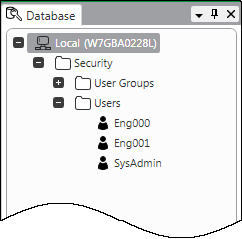Configured user accounts are custom user accounts that you configure on your system. They are regarded as a more secure way of accessing your system as they require manual entry of a username and password. Configured user accounts are used to access ClearSCADA via ViewX, WebX, and by third-party clients that support secure user access.
Users accessing the database using ASB Framework Services have to use a configured user account to log on and should have security settings configured to their requirements.
Typically, you create a configured user account for each user of your system. (The exception to this is if the servers on your system are configured to Create users automatically from group membership, in which case ClearSCADA will create most of the user accounts automatically when triggered to do so. For more information, see Create User Accounts from a User Pattern.)
Each configured or automatically created user account is represented in the database by a User database item.

In the configuration of the User item, you can define various settings for the user account, including specifying whether the user account is managed directly in ClearSCADA. (If a user account is associated with a Windows or LDAP user profile, password management is performed via the relevant Windows domain or LDAP server. If a user account is integrated with a Windows or LDAP user profile, the user's membership of ClearSCADA User Groups is managed automatically (providing that the User Groups themselves are integrated with Windows domain groups or LDAP user groups). If the user account was created automatically, its initial settings are defined by a User Pattern.) Either way, when a user logs on to the system via the user account, they will need to enter the correct user name and password (the user name is the name you give to the User database item).
When a user logs on via a user account, they can only access those features that are made available to their user account. A user account has the following security permissions:
- The permissions that are allocated to the built-in ‘Everyone’ User Group (see Built-In User Accounts).
- The permissions that are allocated to any configured User Groups of which the user account is a member (see Understanding User Groups).
You allocate the permissions to the User Groups on a per database item or Group basis, using the Security window (see Allocating Security Permissions). - The permissions that are allocated to the user account itself.
You allocate the permissions to the User accounts on a per database item or Group basis, using the Security window (see Allocating Security Permissions).
You also restrict, or provide, access to certain features via the User Form for each user account (see Creating a User Account). Changing the configuration of a user account does not affect security permissions, but can result in a user being able to, or being denied, access to certain features (even if they do have the necessary permissions). For example, if you configure a user's user account to have the Configure Database option clear (disabled), that user will not have access to any configuration Forms, even if the security settings for individual database items provide that user with the Configure permission. (In ViewX and WebX, a user has to have access to both the feature and the relevant security permissions for the database items in order to perform their expected activities in ClearSCADA. For more information, see Overview of User Account Security.)
To create and configure a ‘configured’ user account, see Creating a User Account.
To configure the settings for automatically created user accounts (if applicable to your system's setup), see Create User Accounts from a User Pattern.
If a user attempts to access the system without logging on via a user account, they might get logged on automatically via one of the Built-In User Accounts.